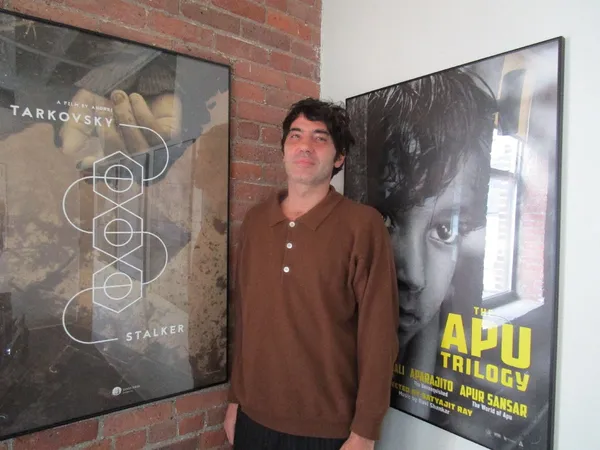Pietro Marcello’s Martin Eden star Luca Marinelli (Andrea in Paolo Sorrentino’s Oscar-winning The Great Beauty) in the title role won the Best Actor Volpi Cup at the Venice Film Festival where the film had its world première. Based on the 1909 novel by Jack London, with a screenplay co-written with Maurizio Braucci (Claudio Giovannesi’s Piranhas, Matteo Garrone’s Gomorrah, Abel Ferrara’s Pasolini), Martin Eden, shot by Alessandro Abate and Francesco Di Giacomo, represents the 20th Century unlike any other film. Jessica Cressy, Vincenzo Nemolato, Marco Leonardi, Carlo Cecchi, Denise Sardisco and Carmen Pommella feature in the excellent ensemble surrounding our troubled hero.
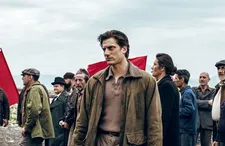 |
| Pietro Marcello on Luca Marinelli in Martin Eden: “We do love Martin Eden in the first part of the film because he's authentic, he's genuine.” |
By transporting the story from the United States to Naples, Marcello anchors Martin Eden’s journey in a specific place, whereas the concept of time has never been more fluid. Turn of the century dresses coexist with popular culture from the Sixties. The looming war, mentioned at one point could be either one of the World Wars, or one that has not yet taken place. Martin Eden is a kind of Bildungsroman where education is front and centre.
As a boy of 11, little Martin went to sea instead of school. When he meets aristocratic Elena Orsini (Cressy), after rescuing her brother from a harbor fight, he is smitten with everything she represents. Her style, her thoughts, her education leave a deep impression on the enthusiastic young man. His charms are many, but not enough to convince her family of his potential as son-in-law. He wants to be a writer, finds inspiration in his mentor Russ Brissenden (Cecchi), and despite an avalanche of rejection letters, ultimately succeeds. Success can be a dangerous beast, as he soon finds out.
Anne-Katrin Titze: The book Martin Eden was published in 1909. Was it ever an option for you to stick to that timeframe? Or did you know from the beginning that you would mix up the 20th Century?
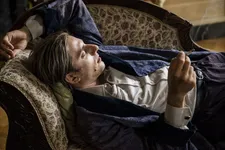 |
| Pietro Marcello on Luca Marinelli as Martin Eden: “He has become a confused person who is the victim of the cultural industry.” |
Pietro Marcello: Jack London's 1909 and Martin Eden definitely have something in common. What he's doing is having a dark-tinted premonition what the short 20th century is going to be like, leading on to the Great War and the disasters that it caused.
And for me Martin Eden is a very contemporary character. So my objective was to span over the entire 20th century but also having a contemporary character with the way we see him in the very end, so depicting the course and recourse of history.
AKT: Can you explain the course and recourse?
PM: What Jack London talks about is something that is not very well-known in the US. Martin Eden as a novel was well-loved in the UK, in Russia, in Italy, in Germany, in France, in Europe as such. It's the story of a child that then becomes a man and redeems himself socially.
At the same time, he becomes a victim of the cultural industry. And then he chooses to commit suicide. So he becomes an anti-hero. Jack London knew Herbert Spencer well. Spencer was a good biologist, at the same time he wrote some horrible things.
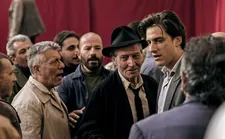 |
| Russ Brissenden (Carlo Cecchi) with Martin Eden (Luca Marinelli) |
After that we had Nietzsche, we had Mussolini, we had Hitler and the 20th century the way we know it. I wanted to make a political film but at the same time I wanted for it to be a contemporary film. And Martin Eden in the end becomes a negative hero, an anti-hero. The character is very fitting with what is happening today. In terms of narcissism and hedonism and influencer culture. And he becomes a victim of himself. In this way he represents what happens in today's society.
AKT: I felt that he was a pre-war person, the way you describe him. But pre-war for three wars. He is pre First World War. Pre Second World War. And pre a future war that hasn't occurred yet.
PM: Yeah. That's interesting what you mean. In the final scene you see him on the beach and on the one hand you have today's migrants and on the other you have some soldiers from the King's army and there are troops. Not a lot of people recognize it. Probably that means that we never came to terms with our history in Europe.
 |
| Martin Eden (Luca Marinelli) with Elena Orsini (Jessica Cressy) |
And up to forty years ago, nobody would have dreamt that we'd be talking about souvereignism again or that fascism would resurge and we'd have politicians such as Orban or Salvini or Trump. History is in cycles and back and forth, but in Europe we did have significant social battles for the rights of childhood, of workers and health. And all of that is completely disappearing and the rich become richer and the poor become poorer.
AKT: There's a wonderful moment in the film that is funny when it happens, but there is much more to it than that. "Bread is education and poverty is the sauce," Martin says at the lunch he is invited to. It's a great moment when he says “Oh, I just wanted an excuse to wipe the delicious sauce off the plate." But truly, it is about poverty and education.
PM: It's metaphoric of our reality what is going on in the story. There is not enough attention to education and education is expensive and one needs a lot of money and not everybody has access to this kind of education. And this is what happens in today's world. Education is possible for those who are privileged and those who aren't are left out.
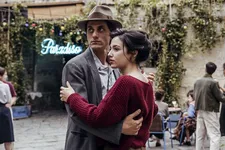 |
| Martin Eden (Luca Marinelli) with Margherita (Denise Sardisco) |
AKT: His desire for education is so strong. I liked very much how it is performed. The whole film is a lot about desire. The desire lost at the end when he says: "I would desire you if I had any desire left." In the beginning is the wanting, for education, for knowledge. You don't see that kind of desire in cinema that much recently. Desire of wanting to know something? Where is that?
PM: He is a naïve character. There is something antique about him. This desire usually stems of a situation in which there is nothing and there's a certain determination in him. That then however leads to the betrayal of his class of origin.
In the final part he no longer has a relationship with reality and therefore he no longer has anything to say. He has become a confused person who is the victim of the cultural industry. All of this has been described by Christopher Lasch in his book The Culture of Narcissism and other philosophers in the Seventies. They had laid the foundation for the description of the entertainment society that we're in today.
We do love Martin Eden in the first part of the film because he's authentic, he's genuine. Whereas in the second part he becomes a negative hero and we tend to leave him to his own destiny. In the book that was different because he was still the character rooted in the 19th century. Whereas in our filmic transposition, Martin Eden is contemporary.
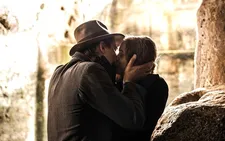 |
| Martin Eden (Luca Marinelli) with Elena Orsini (Jessica Cressy) |
AKT: Talking of entertainment, there is a scene showing a Loïe Fuller dance being performed.
PM: When he goes to a nightclub?
AKT: Yes.
PM: Those are quotes, because in the economy of cinema often I don't have a budget to do what I want to do. So I use archival footage. Those were things I had imagined and they were supposed to be a connection to make people think of the historic avant-garde of the turn of the century.
AKT: It's an interesting choice to have her. Another archival clip was of the Nazi book burning.
PM: Martin Eden in the beginning writes a letter to the Ministry of Culture and he talks about noble populism. This is connected to what was happening at the end of the 19th century in Russia with Tolstoy. There was a situation of the Russian aristocrats that walked towards the people because they say they need the people. That was a symbol of the liberation of the lower ranks of society, of the plebs.
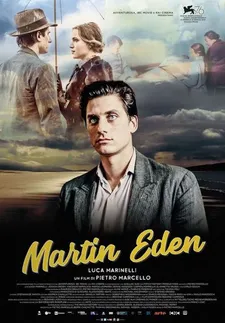 |
| Martin Eden Venice poster |
Then later on Martin walks into a different context in a trattoria in which he meets early-day fascists who praise him. Then they move on to contradict him and they say "We no longer need you because we need the people. And the people already are with us." And then there's the book burning scene. This for me was the way to bridge a clear connection with fascism or Stalinism - which for me are the same thing.
However in the beginning you also have a scene with Errico Malatesta [in archival footage], you know, the gentleman with the cigar. He was Italy's main anarchist leader who promoted the idea of Ethical Voluntaryism. He is a promoter of individualism but connected to socialism. Because individualism without socialism is capitalism in its pure state and it leads to a barbaric state.
AKT: Near the end you have a startling scene with a double. Martin encounters himself. The older self walks by and sees his young self. It's an idea from Romanticism, the idea of the double. Freud talks about it, too, stating you would go insane if you met yourself.
PM: This is one of the things I love the most about the film. This doubling up. He sees himself as a young person. And this was when he had a purity about himself. It's the way he used to be and he can no longer be. When he watches Elena walk away, he sees himself when he was enthusiastic, he was strong and vigorous and brave and daring.
He realises that he wants to be that but he can no longer go back there. He can no longer be what he used to be. Culture has transformed him but culture went from being a positive element to a very negative element that destroyed him. And I'm very pleased that you asked me that because I really care about this and nobody has ever asked me that. So I'm very happy you brought it up.
AKT: I thought it was a pivotal moment.
PM: Nobody thought about the doubling up. When he watches himself and wants to rush to follow him. But he's not anymore the same person.
Martin Eden is also at the London Film Festival.
The 2019 New York Film Festival runs through October 13.








